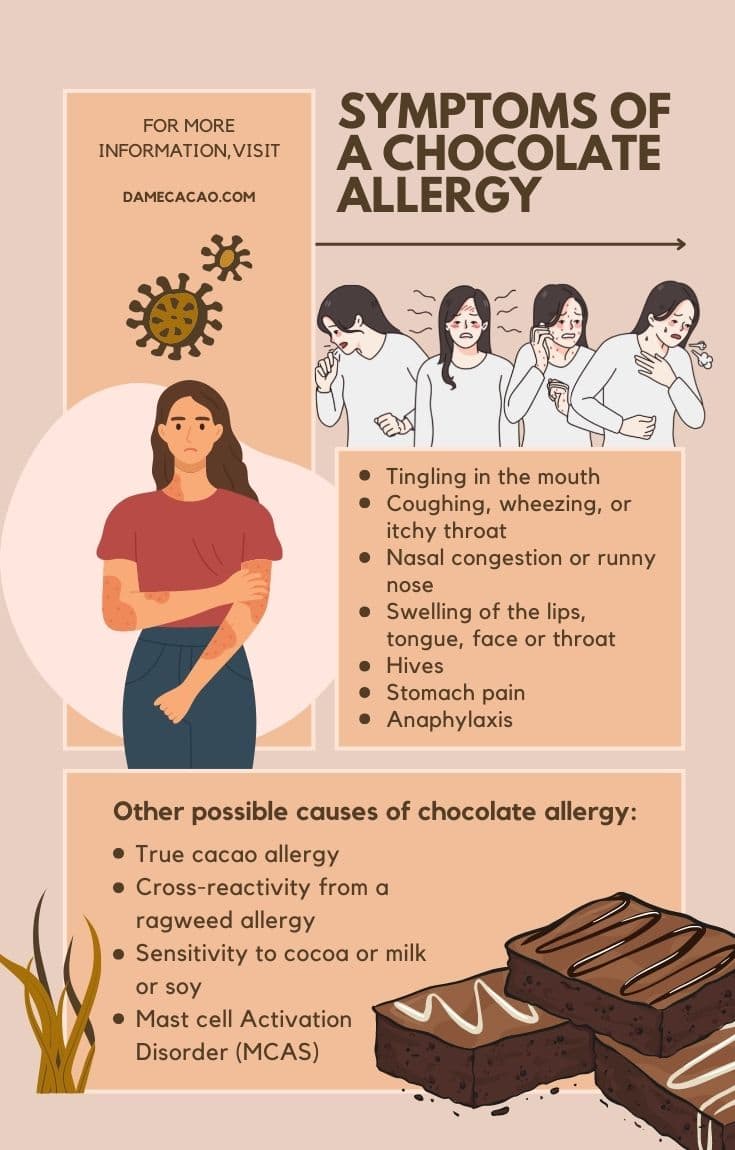Can you be allergic to chocolate? It's not often that someone asks me about the possibility of a chocolate allergy, but it's come up enough that I just had to write about it.
The truth is, people who believe they're allergic to chocolate or have some sort of chocolate sensitivity are more likely allergic to a non-cacao component of the chocolate.
However, there are several other more nuanced reasons why you may experience an allergic reaction to chocolate. These possibilities have everything to do with the cacao itself— read on to learn why.

Jump To
What Is a Chocolate Allergy?
Like any other food allergy (defined as a systemic immune reaction to an foreign substance,) a chocolate allergy is your body's immune response to one or more ingredients in a chocolate product. The issue comes when we try to define 'chocolate.'
Depending on where in the world you find yourself, the chocolate you're thinking of may be a chocolate-flavored candy bar or a two-ingredient dark chocolate bar, or even a brownie or a piece of cake.
If you feel yourself having an allergic reaction to chocolate anything, be it a mild or severe case, it's imperative that you take note of every ingredient in whatever you're eating. Look for the nutrition facts if it's a packaged good, or ask the chef if it's something from a restaurant.
The most basic chocolate you can buy is made up of 100% cacao, and a true allergy to cocoa is incredibly rare; it's more likely that you're reacting to something other than the cacao in your chocolate.
However, some autoimmune conditions can cause your body to treat chocolate and other cacao-containing foods like an invader, similar to a chocolate allergy, but without the blood-level immunomarkers (called Immunoglobulin E, or IgE).
This would be labelled a chocolate sensitivity, due to the lack of IgE present during the reaction, but we'll talk more about that below. The question is, without getting blood work done, how can you know whether you have a chocolate allergy or a chocolate sensitivity?

Chocolate Allergy Symptoms & When To Seek Help
The symptoms of chocolate allergy or allergy-like reactions are the same as any other food allergy. According to the Mayo Clinic, symptoms of a food allergy include:
- Tingling in the mouth
- Coughing, wheezing, or itchy throat
- Nasal congestion or runny nose
- Swelling of the lips, tongue, face or throat
- Hives
- Stomach pain
- Anaphylaxis (a very severe, life-threatening medical emergency which can cause your body to go into shock)
As with any other food issue, you should seek help for a chocolate sensitivity or allergy when it interferes with your daily life. Some people choose to avoid all chocolate out of an abundance of caution.
But unless you're experiencing the life-threatening symptoms of a chocolate allergy, then I urge you to (carefully) test chocolates made with varying ingredients and see which ones you react to.
Try a pure piece of cacao— also called chocolate liquor or cacao mass— first, and see if it causes you problems. If it does, then you might just have a histamine intolerance (more on that below).

Cocoa Sensitivity (Symptoms)
Many people around the world claim to have a chocolate intolerance of some kind. But there are a couple of ways to tell if you have a chocolate allergy vs. chocolate sensitivity, and it starts with cacao (also known as cocoa).
If you have a cocoa sensitivity, symptoms may worsen when you consume chocolates with higher cacao percentages & little to no additional ingredients, similar to gluten consumption for people with celiac disease.
According to the non-profit Cleveland Clinic, food intolerance-based symptoms of cocoa sensitivity include:
- Nausea
- Stomach pain
- Gas, cramps or bloating
- Vomiting
- Heartburn
- Diarrhea
- Headaches
- Irritability or nervousness

Related Allergies & Cross Reactivity
A true chocolate allergy will cause a more severe reaction than a sensitivity, with some or all of the symptoms noted above plus detectable levels of IgE in the blood. But another possible cause for your symptoms is cross-reactivity.
This means that you're reacting to a compound in chocolate which is biologically-similar to one found in something you really do have an allergy to. According to this study, ragweed, tobacco, and coffee all contain substances which are immunologically cross-reactive with cacao.
This means that even if you don't have a direct cacao allergy, it can still cause an allergy-like response in particularly sensitive individuals with a related allergy. Some scientists then recommend avoiding products containing the cola nut and karaya gum, since they all belong to the same botanical family as cacao.
If you happen to have an allergy to any of those substances, your body may be overreacting to cacao due to simple, but unfortunate, molecular confusion. However the most likely culprit of a suspected cacao allergy is cross-contamination with another food or substance you are truly allergic to.
This would cause milder symptoms than one would experience when ingesting larger amounts of the allergen. As one reader pointed out, for those with a nickel allergy, some sources of cacao are high in nickel, and without testing every single bar, there's no way to know whether your chocolate is one of them.
If you suspect you may have a dark chocolate allergy, consider that you may instead have some level of histamine sensitivity (covered below). But if you suspect a milk chocolate or white chocolate allergy, you may actually have an allergy to dairy or a specific milk alternative.
The sugar, milk, and/or caffeine in commercial chocolates are your most likely culprits for any allergy-like symptoms, though it could also be the insect parts (see the next section).

Roaches in Chocolate: Fact or Fiction?
Unfortunately, fact. Many years ago, for a short time major media platforms were covering the fact that there may be roaches in chocolate, along with any number of other insects. Since 1985, the US FDA (United States Food & Drug Administration) has allowed for a certain number of insect parts to be legally left inside a chocolate.
The decree allows for the fact that cacao is an agricultural product, and as such, even with the most careful inspection, it's always possible for a tiny insect to be left behind in a bag of beans.
That certain number of allowable insect bits by the FDA is actually anything below "an average of 60 or more insect fragments per 100 grams," or "an average of more than 1 rodent hair per 100 grams of chocolate, regardless of the size of the hairs or hair fragments."
Well. I suppose it's reassuring that they regulate roach content in chocolate, but it does make you wonder what else might be in your favorite chocolate candy bar.
It's also important to note that even when a company is cited for a violation of FDA guidelines, action is only taken once a company has had time to respond and hopefully correct the infraction (unless action is deemed necessary to protect public health).
So does Hershey chocolate have cockroaches? Well, probably, along with Cadbury's and all the other massive producers. But unless you have some sort of molecular testing kit, you're unlikely to find (or taste) any of them.
However, I'm not a fan of unknowingly consuming bacteria-ridden insects, which may actually be the cause of your chocolate allergy (if you suspect you have one). That's why I only buy craft chocolate; that is to say, chocolates made in small batches by small companies who very carefully source and inspect their cacao.
When a conglomerate like Hershey's is processing thousands of tons of chocolate & chocolate products each week, it's gross but understandable that not every little bug gets caught. I guess that's just part of the price you pay for cheap chocolate.

Histamine Sensitivity (Chocolate Intolerance)
If you're already buying craft chocolate but you're still having cocoa allergy symptoms, then you may be experiencing a condition called Mast Cell Activation Disorder. MCAD, as it's called, is basically an overreaction of your histamine-producing mast cells to high histamine-containing substances (not just food).
When you have an allergy, your immune system overreacts to an allergen by producing Immunoglobulin E (IgE), a type of antibody. These antibodies travel to & communicate with the mast cells, which release histamines, triggering an allergic reaction in your body.
For those with MCAS or even just a histamine sensitivity or intolerance, this means that chocolate can seem to cause an allergic reaction by setting off histamine-production in the mast cells without the presence of IgE.
People who suffer from histamine intolerance can experience a huge variety of symptoms as part of their reaction, and modern research supposes that most people with histamine issues are deficient in histamine-degrading DAO.
Some of the symptoms of histamine intolerance include hives, brain fog, anxiety, stomach pain, IBS, rashes, and similar reactions to other high histamine foods. Honestly, chocolate and histamines have a complicated relationship that merit a post of their own.
This article can help you learn more about chocolate and histamine intolerance, and how you may be able to eat chocolate again without pain.

Chocolate Allergy FAQ
Absolutely! However, most chocolate allergies are due to a non-cacao ingredient in the chocolate or even the insect fragments often found in commercial chocolates. Unfortunately, taking a chocolate allergy test won't tell you much unless you're directly allergic to cacao itself, which is almost unheard of.
There are a few causes of chocolate allergy symptoms, including a true cacao allergy, cross-reactivity from a ragweed allergy, sensitivity to cocoa or milk or soy, or even a condition known as Mast Cell Activation Disorder.
True chocolate allergies are incredibly rare, like one in a million level rare. But if you suspect an allergy to chocolate, talk to your doctor about a food allergy and then a food sensitivity test for cacao.
If you're experiencing an allergic reaction only to white chocolate, you're almost certainly allergic to a non-cacao component, such as milk or soy. This is because cocoa butter, the cacao-derived portion of white chocolate, contains no unique antigens that aren't also found in dark and milk chocolates.
Unless you have a known milk allergy or soy allergy, if eating chocolate gives you a stomachache, you may be experiencing histamine intolerance, a microbiome imbalance, or even cross-reactivity with a chemically similar compound you are truly allergic to, such as ragweed.
Disclaimer: this article is provided for information only. I urge you to speak with your doctor or a licensed medical professional to assess whether or not you have a chocolate allergy or chocolate intolerance/sensitivity.

















BP
This was so helpful!! I'd never heard of histamine intolerance efore
Max
I'm so glad! It's still not commonly talked about, but it's quite a common reason for chocolate issues!
Sara
Very nice article!
It would be nice if in the ‘Related Allergies & Cross Reactivity’ section nickel allergy could also be mentioned, and cacao is high in nickel, and one may think it’s a cacao intolerance when it’s a bit more then that.
It’s a tricky situation to figure out as some symptoms can overlap, so by mentioning nickel allergy it could make people aware of this possibility. It could also possibly lead readers to do research on nickel allergy when they are confident of cacao causing them reactions but they are not the symptoms mentioned in your article.
Max
That's an interesting point, Sara! I did a bit more digging, and you're right that there's a marked level of nickel in some cacao products (and which ones it is, well, they're certainly not advertising). I'll add it to the post now.
Kirk Yardley
I suffer from migraines and I always feel nauseous the next morning after eating some cacao. Some cookies will do it if they have chocolate and that Mudwater mushroom coffee stuff does it horribly. The thing is Ben and Jerry’s ice cream and many other chocolate items don’t cause it. Is there just way less cacao in them? Could it even be possible to have a sensitivity to cacao and not cocoa? Any feedback would be greatly appreciated
Max
There is definitely less cacao in Ben & Jerry's and other chocolate-flavored desserts— I'm no expert, but I encourage you to look I to something called 'histamine intolerance' or mast cell activation syndrome. From the foods you seem to be reacting to, the one co.monaliry I note is a histamine connection. Definitely don't ignore those symptoms, though, and I encourage you to talk to your doctor about it.
Emmy
Every time I try to research cacao allergy information, I run across articles like this and I have to dig through for actual information. I am the one in a million.
I’d love an article/post with more information. I can’t seem to find anything besides the basics.
Max
If you know for 100% sure that you have a cacao allergy, what other information are you looking for? I'm truly not sure what I could further elaborate on, but I'd love to help if I can!